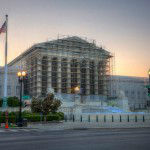Divided U.S. Supreme Court Allows Controversial Texas Abortion Law to Stand

The justices of the U.S. Supreme Court are often as sharply divided as the rest of the country. By a vote of five to four, the Court recently refused to set aside a lower court order allowing a controversial Texas abortion law to take effect.
The law in question mandates that any physician who performs an abortion must have professional privileges to admit patients to a hospital within 30 miles of the clinic where the procedure will occur. Opponents of the law filed suit, arguing that the new restriction prevents one third of Texas clinics from providing abortions.
A Texas federal judge agreed, concluding that the law placed a “substantial obstacle” in front of women seeking an abortion. However, the U.S. Court of Appeals for the Fifth Circuit subsequently stayed the injunction after concluding that the admitting privilege requirements do not place an “undue burden” on a woman’s right to an abortion by requiring them to travel a longer distance to obtain one.
While the Fifth Circuit’s full review of the constitutionality of the law is pending, the plaintiffs filed an emergency appeal with the Supreme Court, asking the justices to block implementation of the law. For now, the justices have refused to intervene.
The Court’s order included two written opinions. Justices Antonin Scalia authored a concurring opinion, which was joined by Justices Samuel A. Alito, Jr. and Clarence Thomas. Justice Scalia argued that blocking the law “would flout core principles of federalism by mandating postponement of a state law without asserting that the law is even probably unconstitutional.”
Meanwhile, Justice Stephen G. Breyer wrote a dissenting opinion, whose signatories included Justices Ruth Bader Ginsburg, Elena Kagan, and Sonia Sotomayor. The dissenters argued that lifting the stay interfered with the status quo in Texas, thereby impacting a “significant number of women seeking abortions.” Breyer further noted that the “longer a given facility remains closed, the less likely it is ever to reopen even if the admitting privileges requirement is ultimately held unconstitutional.”
Chief Justice John Roberts and Justice Anthony Kennedy did not write separately or join either of the opinions. However, given that it would have required five votes to overturn the Fifth Circuit, they are presumed to have voted with their conservative colleagues.
The deep divide among the conservative and liberal members of the Court is particularly significant given that the constitutionality of the Texas law is all but certain to appear before the Court in the near future. A final ruling from the Fifth Circuit is expected in early 2014.
Previous Articles
SCOTUS Wraps Up Oral Arguments for the Term
by DONALD SCARINCI on May 17, 2022
The U.S. Supreme Court has concluded its oral arguments for the October 2021 Term. The justices hea...
SCOTUS Rules Censure of Elected Board Member Didn’t Violate First Amendment
by DONALD SCARINCI on May 10, 2022
In Houston Community College System v. Wilson, 595 U.S. ____ (2022), the U.S. Supreme Court held th...
Supreme Court Breach Is Not the First Involving Roe v. Wade
by DONALD SCARINCI on
The recent disclosure of Justice Samuel Alito’s decision purporting to overturn Roe v. Wade is ar...
The Amendments
-
Amendment1
- Establishment ClauseFree Exercise Clause
- Freedom of Speech
- Freedoms of Press
- Freedom of Assembly, and Petitition
-
Amendment2
- The Right to Bear Arms
-
Amendment4
- Unreasonable Searches and Seizures
-
Amendment5
- Due Process
- Eminent Domain
- Rights of Criminal Defendants
Preamble to the Bill of Rights
Congress of the United States begun and held at the City of New-York, on Wednesday the fourth of March, one thousand seven hundred and eighty nine.
THE Conventions of a number of the States, having at the time of their adopting the Constitution, expressed a desire, in order to prevent misconstruction or abuse of its powers, that further declaratory and restrictive clauses should be added: And as extending the ground of public confidence in the Government, will best ensure the beneficent ends of its institution.




